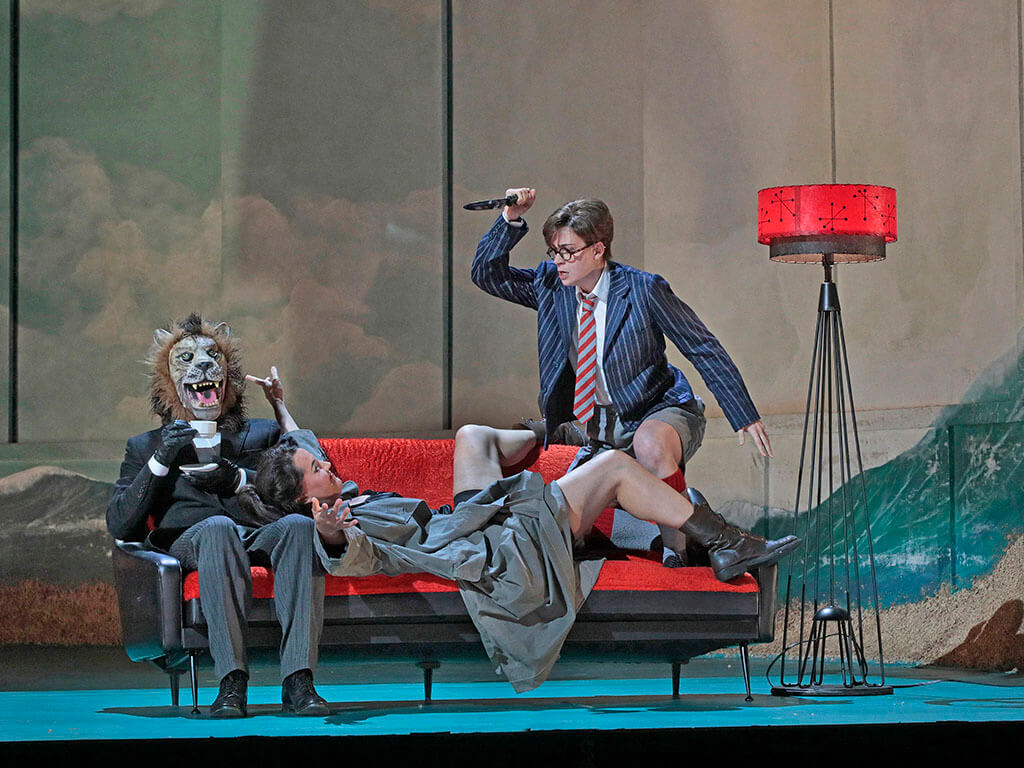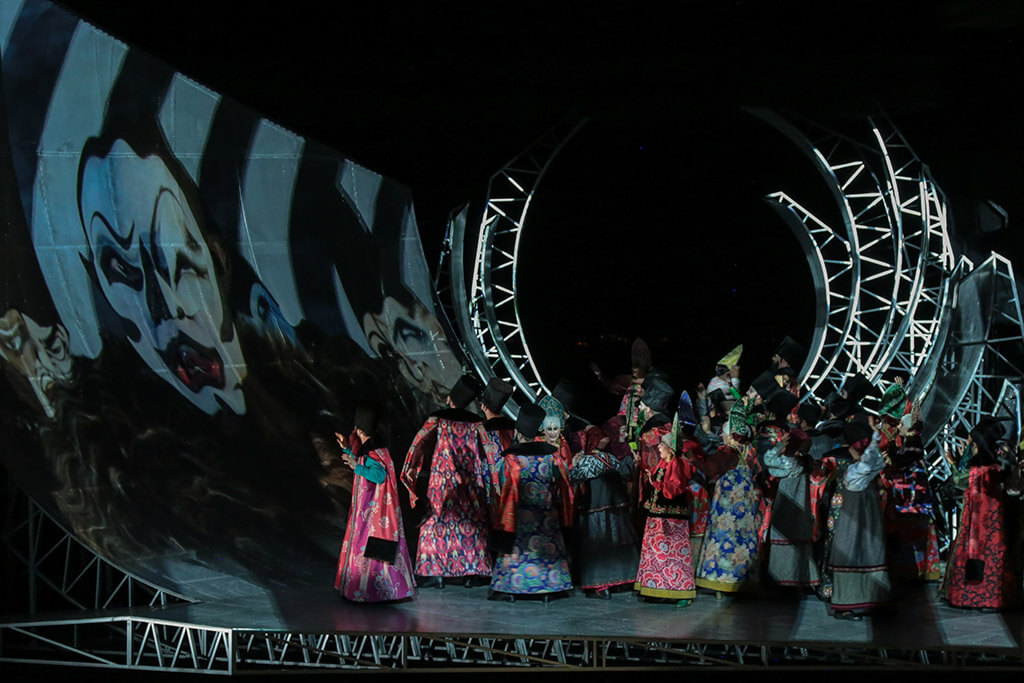
Handel: Alcina. Elza van den Heever, Anna Christy, Paula Murrihy, Daniela Mack, Jacqueline Stucker, Alek Shrader, Christian van Horn. David Alden, director. Harry Bicket, conductor. Santa Fe Opera, Aug. 2, 2017.
Rimsky-Korsakov: The Golden Cockerel. Venera Gimadieva, Meredith Arwady, Barry Banks, Tim Mix, Kevin Burdette. Paul Curran, director. Emmanuel Villaume, conductor. Santa Fe Opera, Aug. 3, 2017.
One of the pleasures of Santa Fe Opera is their excellence in presenting Baroque works, hiring cutting edge stage directors and a mix of international stars and up-and-coming young artists in principal roles. Now with Early Music specialist Harry Bicket at the helm, this tradition is alive and well. The Baroque piece of choice this summer was one of Handel’s most remarkable creations, Alcina.
The production by David Alden premiered in Bordeaux in 2012 with South African soprano Elza van den Heever in the title role, who reprised it here. In the interim, this production was revised with modifications to great acclaim at Teatro Real (Madrid) starring Canadian soprano Karina Gauvin. David Alden’s vision of Alcina is archetypal of the current trend of staging Baroque, by eschewing historically informed practice in favour of a completely contemporary approach, at least dramatically speaking.
It’s been argued that in order to make this nearly 300-year old piece relevant to 21st century audiences, the trick is to not worry too much about historical context, and instead to focus on the emotions of the characters that drive the story. To avoid a static, stand-and-sing approach, contemporary directors tend to frame it in improbable settings far removed from the original. A rare exception to this was the 2014 production by Toronto’s Opera Atelier where the piece was presented “straight.” That has always been the raison d’être of OA: bucking the trend. It has served the company well in its history. The OA version had superb vocalism and lovely stage design by Gerard Gauci, but arguably it wasn’t as much fun.
The story in a nutshell—the sorceress Alcina casts a spell on many young men she fancies, and when she’s tired of them, she turns them into animals, plants, and inanimate objects. Alcina lures Ruggiero to her island and makes him forget his girlfriend Bradamante back home. Bradamante decides to take matters into her own hands by disguising herself as a young man, Ricciardo. Together with her tutor Melisso, they go to Alcina’s island to rescue Ruggiero. Meanwhile, Morgana, Alcina’s sister, falls in love with the disguised Ruggiero, and she casts aside her own lover, Oronte.
If you’re befuddled by this insanely complicated plot, you are not alone—and that’s only a start! With these very long Handel pieces that last many hours, my personal strategy is to 1) not have any preconceived notions of what I am supposed to see on stage, and 2) relax and just luxuriate over the divine Handel score. It usually works, even if the staging isn’t so interesting, like the COC Ariodante last winter. With Alcina, I was very pleasantly surprised at how colourful and entertaining the Alden production was. Combined with great singing, the evening was a smashing success.
Alden sets it in an abandoned theatre, with some significant modifications from the Teatro Real (Madrid) set in 2015. Right at the start, during the overture, some of the singers entered the stage by coming down the aisles of the theatre, with Oronte dressed as an usher! It certainly sets the tone for the rest of the evening. Alden takes Alcina’s ability to turn her former lovers into animals seriously—hence the various characters wearing animal heads onstage. There were also acrobats, animal skeletons, and a spine dangling from the ceiling with a naked lightbulb at the end. It left me speechless, I must say, but it also made me appreciate Alden at his most in-your-face, outrageous mode. I tend to get a little queasy with extreme directorial makeovers, but when it’s done with as youthful and energetic a cast as this one, one that is willing to take risks on stage, I found myself being won over.
Elza van den Heever, the alternate COC Norma last season, was a statuesque, regal Alcina. The staging for her was essentially static in Act One—only later did she participate in the shenanigans. Vocally the role suits her well, showing off her ability to spin a long line with seamless legato. Her best moment was the affectingly delivered “Ah! Mio cor,” where she held the stage beautifully in the very long aria. If Alcina is the serious one, her sister Morgana is over-the-top funny in this production, looking like someone straight out of the Folies Bergère cabaret hall. Kudos to soprano Anna Christy for being totally game—if anything she looked like she was having a terrific time. She certainly got the biggest laughs of the evening. Her light soprano suited the role, a few edgy moments at the top notwithstanding.
In this opera, the men are relegated to supporting roles. Tenor Alek Shrader (Oronte) took full advantage of his few moments in the spotlight, offering a felicitous combination of lyricism and humour. Christian Van Horn, who sang a wonderful Raimondo just two nights earlier in Lucia, was once again vocally and physical imposing, this time as Melisso. Young Argentinean mezzo Daniela Mack was a fabulous Bradamante. For me, top vocal honours went to Irish mezzo Paula Murrihy as a totally believable Ruggiero, all the more stunning given she had just sung Orlofsky in Die Fledermaus the night before! SFO Music Director Harry Bicket was in his glory in Handel, serving up a performance of elegance and subtlety.

The comparative rarity of this season was Rimsky-Korsakov’s The Golden Cockerel. Although I’ve been attending live opera for fifty years, this was my first in-house encounter with this piece. Much to my regret, I missed the chance of seeing Beverly Sills as the Queen of Shemakha at the New York City Opera during my student days, but as they say, better late than never! This is one of those fantastical operas that needs to be larger than life, capturing the audience’s imagination. It must have fine voices to be sure, particularly a great Queen, not to mention a fine orchestra, and an imaginative production. On balance, the SFO production was a very fine effort.
The story, based on Pushkin, is about a bumbling ruler Tsar Dodon who, fearful of attack by his enemies, accepts an offer of a golden cockerel from a mysterious Astrologer. The Golden Cockerel’s claim to fame is its ability to detect impending attack. As a reward, Dodon grants the Astrologer a single wish of his choice, to be collected later. The bird signals a warning, and Dodon goes to war. But instead of fighting an army, he encounters the beautiful Queen of Shemakha, who proceeds to seduce him. When Dodon returns with his new Queen, the Astrologer asks for his reward, which turns out to be the Queen herself. Dodon refuses and slays the Astrologer, but the Golden Cockerel, loyal to his original master, exacts revenge by pecking the Tsar to death.
Charming story, right? But it’s par for the course, as European folk stories are often thinly disguised morality tales. Given that opera company programming is planned years in advance, the timing, however serendipitous, was pure coincidence. I imagine few in the audience could have been totally unaware that this opera is actually a clever piece of political commentary, now a perfect allegory for present-day American politics. As if to underscore the child-like buffoonery of Dodon, he wears highly unflattering red overalls, and climbs on his oversized throne with difficulty. The Queen is super-glamorous, all decked out in a glittering traditional costume which she proceeds to take off in a slow striptease. In Act Three, she changes into a white, form-fitting designer pantsuit that would look good on the wife of the Emperor.
The Gary McCann set design is incredibly colourful, his costume designs beyond stunning. That said, there are two blemishes. The curved wall on the left where most of the projections takes place cannot be seen by audiences sitting in the extreme front left of the auditorium. Substantially more seats also have a poor view. This is a case where stylistic decisions trump practicality, in my mind a serious flaw. Given the fairy-tale nature of the story, magic is an important component. But any attempt at magic is done through projections alone. If one doesn’t have a really good view of the stage, its effect is diminished, no matter how deftly directed it is by Paul Curran. Somehow, a movie of a bird pecking Dodon to death doesn’t quite work.
Musically it was a very strong performance. The Rimsky-Korsakov score is strikingly original, with lush orchestration, a kaleidoscope of tone colours that’s highly suggestive of the Orient. The several instrumental solos allowed individual musicians to shine, and the orchestra under French maestro Emmanuel Villaume played fluently. Typical of Russian operas, the chorus is vital in this show, and the SFO chorus was up to the task. American baritone Tim Mix was a vocally and dramatically vivid Tsar Dodon, although his baritone didn’t quite have the dark resonance and gravitas of a bass. British tenor Barry Banks made a welcome return to SFO as the Astrologer, a role chock full of impossibly high notes, which Banks dispatched with aplomb.
American contralto Meredith Arwady sang Amelfa the housekeeper, one of those typical Russian comprimaria roles, here sung with plummy tones and acted with relish by Arwady. The Golden Cockerel in this production is heard but not seen, here nicely sung by Apprentice soprano Kasia Borowiec. To my ears, top vocal honours of the evening belonged to Russian lyric-coloratura Venera Gimadieva as the Queen of Shemakha. Not too many sopranos can look as good and sound as great as Ms. Gimadieva—no wonder she’s in great demand as the Queen, a role she has already sung at the Bolshoi, Madrid, and La Monnaie (Brussels). Her big Act Two aria showcased her gleaming, well focused tone. The soprano deservedly received the biggest ovation of the evening.
For those who are curious, do watch these short clips from the Santa Fe production, in which Gimadieva shares her thoughts on this role:
For more REVIEWS, click HERE.
Want more updates on Toronto-centric classical music news and reviews before anyone else finds out? Follow us on Facebook or Twitter for all the latest.



